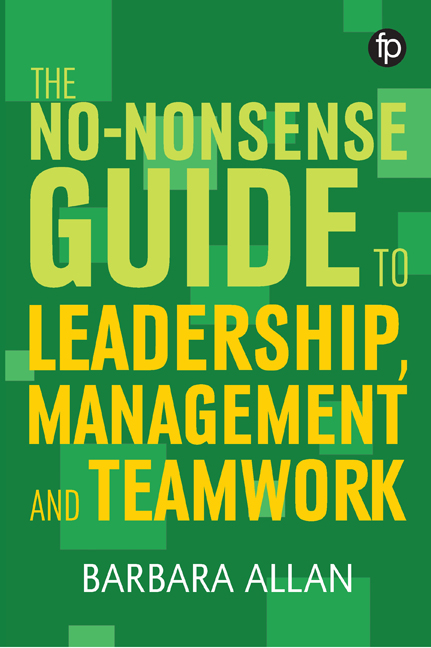Book contents
- Frontmatter
- Contents
- List of figures
- List of tables
- List of case studies
- Acknowledgements
- 1 Leadership, management and teamwork today
- 2 Getting started
- 3 Strategic leadership
- 4 Confident leadership and management
- 5 Leading and managing your team
- 6 Managing the work
- 7 Project management
- 8 Introducing and managing change
- 9 Communications
- 10 The people side of management
- 11 Managing money
- 12 Lifelong professional development
- Index
- Frontmatter
- Contents
- List of figures
- List of tables
- List of case studies
- Acknowledgements
- 1 Leadership, management and teamwork today
- 2 Getting started
- 3 Strategic leadership
- 4 Confident leadership and management
- 5 Leading and managing your team
- 6 Managing the work
- 7 Project management
- 8 Introducing and managing change
- 9 Communications
- 10 The people side of management
- 11 Managing money
- 12 Lifelong professional development
- Index
Summary
Introduction
The aim of this chapter is to provide guidance on essential communication skills for library managers and leaders. Clear communications result when you know your audience and present your message clearly and concisely. It also means understanding and responding to feedback through a respectful dialogue. The following topics are considered: briefings; e-bulletins; e-mails; infographics; meetings; networking; personal presentation; presentations (including international presentations); report writing; social media. It is worth noting that team communications are considered in Chapter 5.
Briefings
Briefings are commonly used to inform others about a particular situation or issue. If you are briefing your colleagues then think about the following.
Choose the right time and place. The timing is important – do you want colleagues to have the rest of the day to think about the news and discuss it amongst themselves? If you are delivering bad news then communicate it as soon as possible – rumours start very quickly and you need to be ahead of them. Think about the venue, layout of the room, and timing of the meeting. Some rooms and their standard layouts are not conducive to giving and receiving information and can immediately set up a ‘them and us’ dynamic.
The invitation to the meeting. Consider how you invite your colleagues to the briefing meeting. If you are going to share bad news with them then it is sensible to forewarn them. It gives colleagues time to prepare for the news. Don't go into details about the content of the meeting and don't provide false reassurances in your invitation.
Plan your message. Get all the facts. Know how the situation has arisen and the options. Be clear about the decision-making process and be prepared to share it with colleagues. Prepare your brief and consider whether or not you need to use visual props such as PowerPoint.
At the start of the briefing, attract colleagues’ attention. Make sure you have everyone's attention before you start speaking. Welcome everyone and thank them for attending the briefing session.
Use the TV news habit of delivering the message three times. Tell them what you are going to tell them, tell them and then summarise the news. This helps colleagues to take in the news and understand it.
- Type
- Chapter
- Information
- The No-nonsense Guide to Leadership, Management and Team Working , pp. 159 - 176Publisher: FacetPrint publication year: 2019



